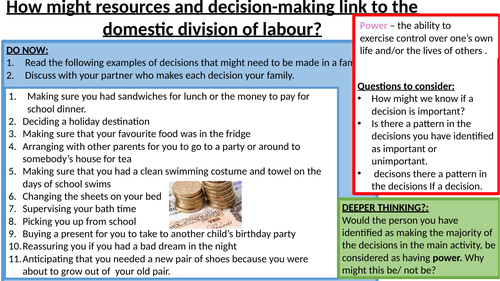AQA A-level Sociology Families: Topic 1 Couples - LESSONS, KEY TERM SHEET & REVISION LESSON
Bundle for AQA A-level Sociology Couples topic in the Families unit. Bundles includes 5 lessons, a key term sheet (for students to fill out) for the topic and a revision lesson (see below for more information on each):
**LESSONS **
- Most answers to main activities included. Refers to key terms from previous lessons and units students might know that link and uses and refers to ’ AQA A Level Sociology Book One Including AS Level: Book one 3rd Revised edition by Rob Webb, Hal Westergaard, Keith Trobe, Annie Townend ’ textbook. ALL RESOURCES CAN BE FOUND AT THE END ON THE PPT
L1 - Detailed and differentiated (up and down) student-led lesson that examines and analyses the following key terms to introduce students to the main family structures: Family, Household,Family structure/ type, Nuclear family, Lone-parent family, Same-sex family, Reconstituted family (or blended family) , Beanpole family, Extend family (horizontally and vertically) , Empty-nest family, Cohabitating couples, Contemporary society, Traditional, Family diversity, Living Apart Together/ LATs (extension)
L2 - Detailed and differentiated (up and down) student-led lesson that examines and analyses the following key terms to introduce students to the traditional functionalist (Parsons) view of the domestic division of labour:
Domestic labour , Domestic division of labour, Conjugal roles
Conjugal (extension), Conjugal relationships (extension), Joint conjugal roles, Segregated conjugal roles, Instrumental role, Expressive role, Conjugal relationships (extension), Pre-industrial society (extension), Industrial Revolution (extension),
Consumption (extension)
L3 - Detailed and differentiated (up and down) student-led lesson that examines and analyses the following key terms to examine march of progress and feminist views of how women’s involvement paid work has had an impact on the domestic division of labour:
Dual‐earner couples, The New man, The ‘march of progress' view
Double shift / dual burden, Triple shift, Emotion work, Cultural/ Ideological explanation (of segregated conjugal roles), Material/ Economic explanation (of segregated conjugal roles)
Ideology, Geographic mobility (extension), Commercialisation (extension)
* Examines the ideas of :Young and Wilmott, Oakley, Hochschild , Gershuny/ Sullivan, Ferri and Smith, Crompton and Lyonette
L4 - Detailed and differentiated (up and down) student-led lesson that examines and analyses the following key terms to examine how money might be managed and how decision-making might be organised in families : Power, The allowance system, Pooling, Cultural/ Ideological explanation (of decision making), Material/ Economic explanation of inequality (of decision making),Personal life perspective (of money)
* Examines the views of the following sociologists:
PAHL AND VOGLER (1993), Barret and McIntosh, Kempson, EDGELL, Laurie and Gershuny, CROMPTON AND LYONETTE, Pahl
L5 - L5 AQA A-level Families- Couples: Domestic violence
Detailed and differentiated (up and down) student-led lesson that examines and analyses the following key terms to examine patterns and explanations of domestic violence: Domestic violence/ abuse, Radical feminists, Materialism,
Marxist feminism, Radical feminist explanation (of domestic violence)
Marxist feminist explanation (of domestic violence),Materialist explanation (of domestic violence)
* Examines the views of the following sociologists: Dobash and Dobash, Millet and Firestone, Wilkinson and Pickett, Ansley
**KEY TERM SHEET **
Key term sheet for AQA A-level Sociology Family Topic 1 Couples that requires students to fill out the definitions themselves. Includes some sentence starters for more difficult topics.
Good form of revision for students and can be used as a revision resource to develop AO1 once filled out.
**BASED ON CONTENT in textbook - AQA A Level Sociology Book One Including AS Level: Book one 3rd Revised edition by Rob Webb, Hal Westergaard, Keith Trobe, Annie Townend ’ textbook
**REVISION LESSON - **
Detailed and differentiated (up and down), student led lesson that teaches exam skills and recaps ‘Couples’ content of AQA specification; recaps the main sociologists and themes in the ‘Family’ unit, Topic 1 – Couples WHILST teaching students how to use the Assessment Objectives (AOs) -AO1, AO2, AO3- to further develop their answers using MODEL ANSWERS and examples.
NOTE – Students will need to have gone over or have a basic understanding of using a set success criteria or writing format for their paragraphs TO BE ABLE TO GAIN THE MOST OF OUT THIS LESSON – this lesson using set success criteria PEELE/A (for 20 markers) and PERD (for 10 markers).
**RESOURCES CAN BE FOUND AT THE END OF THE PPT.
**
**ANSWERS FOR MOST OF THE ACTIVITIES CAN BE FOUND ON NEXT SLIDE AFTER ACTIVITY SLIDE
**

